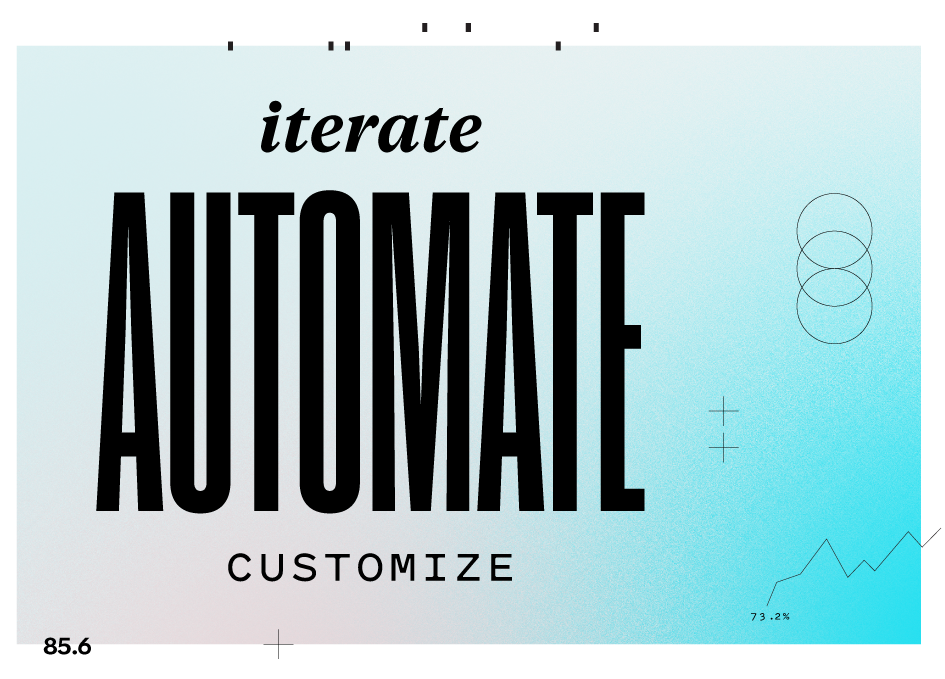
Intelligent Products
Intelligent products and wealth management: Customer-centric, organizationally critical
Note: Interested in learning more about Intelligent Products? Start here: "Products are static. Intelligent Products are dynamic."
Responding to a changing business and competitive landscape, as well as a shifting customer base, successful wealth management firms are leaning into the advantages inherent in cutting edge technologies. They are personalizing customer experiences, growing their client base from a new generation of customers, and driving growth with accurate, predictive analytics—all while staying fully compliant with a changing regulatory landscape. And that means building intelligence into their products, services, and experiences.
Intelligent products take insights, make them actionable, then create more powerful, meaningful, and performant products over time. They use machine learning to not only improve automatically through experience and data, but also manage and streamline repetitive and complex tasks that can be subject to human error.
Let’s take a look at three ways wealth management organizations are using intelligent products to add value while helping their customers build and maintain wealth today, and into the future.
Customer experience
Putting people at the center
Great customer service drives greater customer loyalty. And keeping up with shifting expectations around personalization puts you ahead of the curve—especially when it comes to portfolio management. More comprehensive and insightful customer profiles can be created using your organization’s copious data. Which can then be leveraged to develop more predictive analytics that offer clear visibility into clients’ purchase patterns and inclinations to offer personalized investment advice.
Analyzing how your business evaluates, iterates, and learns will help you be uniquely positioned to determine which holdings should remain in a portfolio and, perhaps more importantly, which should not. It’s intelligence that can continuously weigh thousands of factors—a given company’s financial health (risk/reward); industry or stock class historical performance; overall market trends—and make recommendations that dovetail with each customer’s well-documented risk aversion and financial goals.

And it goes beyond past behaviors to automate recommendations, product intelligence can also help strengthen client relationships by offering data to tailor those personal connections at every touchpoint and every life stage, spanning the entire client journey.
In fact, many firms are already on the road to product intelligence. A new Arizent study finds that the wealth management industry is deploying AI tools in a significant number of cases at a rate three times higher than those in banking, and even higher when compared to mortgage and insurance. (1)
Democratize investing
Widening the playing field
There’s a shift happening not only in management, but wealth itself. Investors seeking services are trending younger, with Millennials and Gen Z comprising a growing portion of the investment dollar. In fact, in addition to an earning power that is increasing exponentially, these generations are set to inherit an estimated $72.6 trillion over the coming two decades. (2)
While white-glove service has long been the backbone of wealth management, new investors are also seeking speed, immediate accessibility, and convenience. Not just more personalized, data-driven investment advice, but also new platforms, new opportunities that only incorporating product intelligence can provide.
Financial institutions that invest in building product intelligence into every part of their business can better serve this new breed of wealth investors. For instance, this information can drive quicker iteration and constantly updated services, so organizations can roll out new products and product improvements at an accelerated rate. It can also help a business respond to changing market forces in a more seamless, continuous manner while providing actionable insights and deeper understanding of this new customer base.
And the inherent speed and security of the cloud platforms underpinning product intelligence also make more robust self-service options possible, like robo-advisors and automated customer service. Lately, the industry is seeing a wave of FinTechs rising to meet this new investor class, wealth management firms would be wise to dive in as well.
Operational efficiencies
Always top of mind
Human error costs the financial industry billions of dollars each year through changing financial regulations, outdated technologies, or simple negligence. In fact, a study by Bain & Company estimated that governance, risk, and compliance account for 15% to 20% of a financial institution’s operational costs. (3)
Optimizing processes and systems is a smart way to both alleviate compliance concerns and drive operational efficiencies. And savvy organizations find value in incorporating product intelligence into their entire organizational structure.
Intelligent products can augment and automate compliance and risk management functions by standardizing data sources and integration, while advanced analytics draw actionable insights that are continuously refined and improved. This automated regulatory compliance management and reporting removes the onus from individuals and makes it an efficient, org-wide function.
And that, in turn, allows organizations to shift employee attention from manual analysis and its attendant administrative operations to more high-value activities. It’s both a cost saving and employee quality of life enhancement. What’s more, with the regulatory landscape in a constant state of change, intelligent products help systemize monitoring, decision-making, and reporting tasks to help you stay vigilantly compliant.
Conclusion
Change is the only constant, and few industries feel the axiom as acutely as wealth management. But like the other side of that proverbial coin, change is also a tremendous opportunity. And intelligent products offer the ability to meet these opportunities head on, by:
- Helping you connect with—and better serve—a shifting customer base craving a more personalized, but natively digital, touch.
- Operationalizing complex, routine tasks allowing your people to focus on mission critical work that drives greater job satisfaction.
- Leveraging the very latest technologies to automate your risk management and regulatory compliance functions.
Companies like Fidelity, Morgan Stanley, and Goldman Sachs are looking at ways to enable advisors and firms to better meet their investors’ needs.
They are evaluating the massive amounts of data they have, connecting them to modern tech stacks, then leveraging machine learning to create intelligence that feeds their operations. This drives efficiency and unlocks more timely information, scale, and improved experiences.
Intelligent products have the power to affect nearly all aspects of your wealth management business and form the cornerstone of your organization’s revolutionary future.
For the full story on how intelligent products can grow your company, download the whitepaper.
(1) Justin L. Mack, “Wealth managers embrace AI, machine learning faster than other financial services firms,” Financial Planning, August 6, 2022
(2) Cerulli, “U.S. High-Net-Worth and Ultra-High-Net-Worth Markets 2021,” January 2022
(3) Matthias Memminger, Mike Baxter and Edmund Lin, “Banking Regtechs to the Rescue?” September 18, 2016